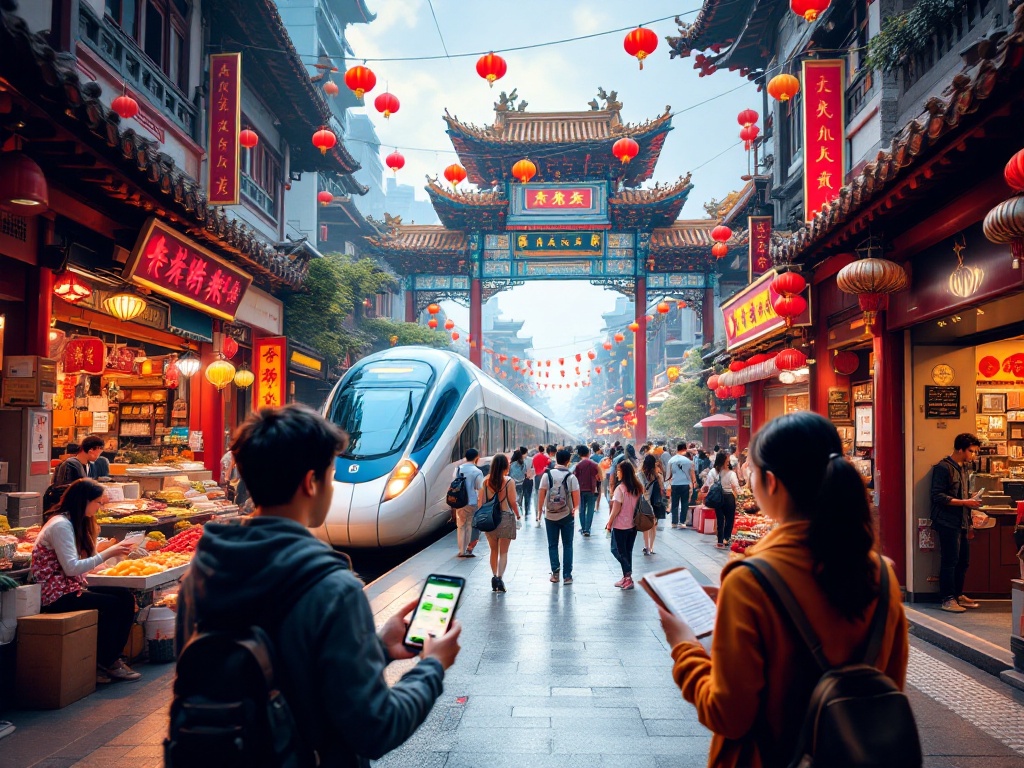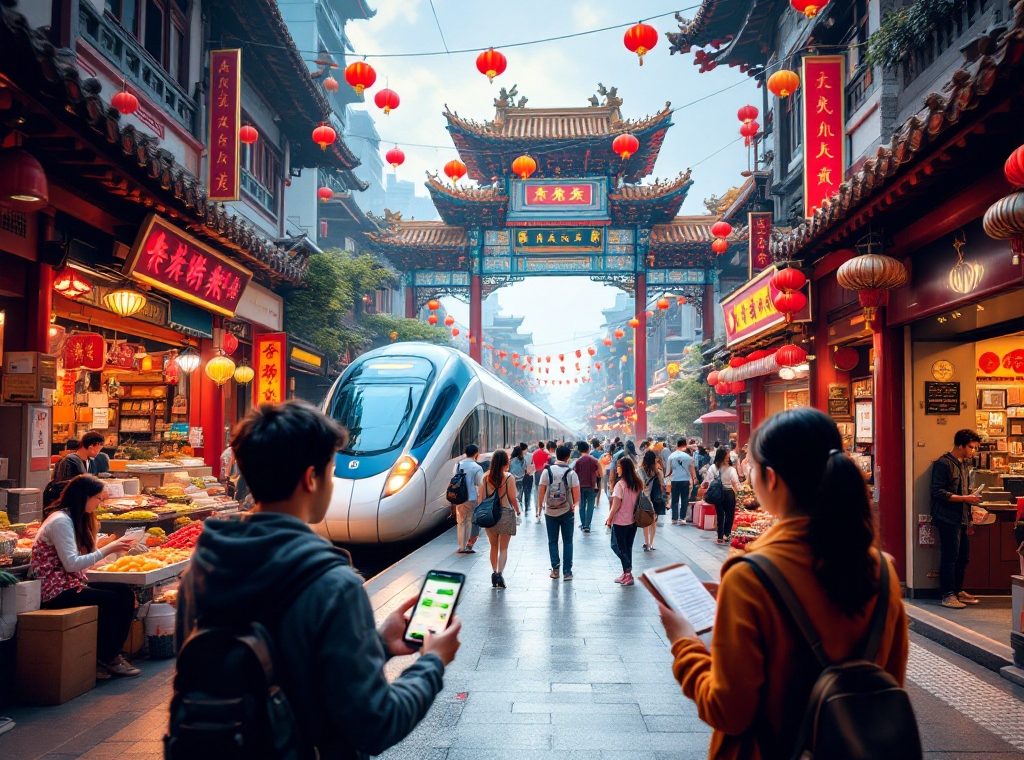Travel China Guide: Essential Tips for First-Time Visitors
Planning an unforgettable trip to China? Discover crucial visa requirements, from the common 30/60/90-day L Visa to visa-free transit options for select cities. Learn how to navigate local customs, master basic Mandarin, and explore efficient transportation like high-speed rail and convenient metro systems. Unlock seamless online access with a VPN and embrace the cashless society with WeChat Pay. Prepare for an enriching journey by diving into our comprehensive guide now!
Important information

- Most visitors need a visa. The tourist visa (L Visa) allows stays of 30, 60, or 90 days. Apply at the Chinese embassy or consulate with your itinerary, hotel bookings, and financial proof.
- Spring (March-May) and Autumn (September-November) offer the best weather. Summers are hot and humid, while winters are cold, especially in the north.
- Mobile payments (WeChat Pay and Alipay) are widely used. While cash is accepted, having these apps linked to your bank account or credit card is highly recommended.
- Download a VPN before arriving. China’s “Great Firewall” blocks sites like Google, Facebook, and Twitter. A VPN bypasses these restrictions.
- Learn basic Mandarin phrases. Simple greetings like “Nǐ hǎo” (hello) and “Xièxie” (thank you) can enhance your interactions with locals.
Visa Requirements for Travelers to China
Planning a trip to China? Most travelers need a visa in advance. The most common is the L Visa for tourists, allowing stays of 30, 60, or 90 days. Apply at your local Chinese embassy or consulate with your itinerary, hotel bookings, and financial documentation. For longer stays, apply for an extension at the Public Security Bureau (PSB) before your visa expires. Note that approval isn’t guaranteed. Some cities offer visa-free transit for eligible nationalities, allowing stays of 72 or 144 hours. Remember, your passport must be valid for at least six months beyond your departure date.
Determine your visa requirements. Most travelers need a visa, typically the L Visa for tourists, offering stays of 30, 60, or 90 days.
Apply at your local Chinese embassy or consulate. Provide your itinerary, hotel bookings, and financial documentation.
For longer stays, apply for an extension. Visit the Public Security Bureau (PSB) before your current visa expires, keeping in mind approval isn’t guaranteed.
Check for visa-free transit eligibility. Certain cities offer visa-free stays of 72 or 144 hours for eligible nationalities.
Ensure your passport validity. Your passport must be valid for at least six months beyond your planned departure date.
Tourist Visa (L Visa): What You Need to Know
Planning a trip to China? You’ll likely need a Tourist Visa (L Visa). This visa allows for stays of 30, 60, or 90 days depending on your nationality and the specifics of your application. Apply at your local Chinese embassy or consulate. Remember to bring your itinerary, hotel bookings, and proof of funds. Need to stay longer? Visa extensions might be possible through your local Public Security Bureau (PSB) before your current visa expires, but they are not guaranteed. Check if your chosen destination offers short visa-free transits. This can be a convenient option for shorter stays.
Preparing Your Passport: Validity and Requirements
Ensure your passport’s validity extends for six months beyond your departure from China. It must also have enough blank pages for visas and entry/exit stamps.
When to Visit China: Best Times and Weather Considerations
China is delightful in spring and autumn, offering pleasant weather. Spring, from March to May, features comfortable temperatures and blooming flowers. Consider these factors when planning your trip.
Autumn, September to November, showcases crisp air and stunning foliage. While these seasons are ideal, summer can be hot and humid, especially in the south and east. Conversely, northern winters are quite cold.
Spring and Autumn: Ideal Seasons for Travel
For an ideal trip to China, consider visiting during the pleasant temperatures of spring (April–May) or autumn (September–October). Spring offers vibrant blossoms and breathtaking scenery, while autumn boasts crisp air and stunning foliage. The average temperatures during these seasons make outdoor activities enjoyable.
Spring (April-May)
Experience the beauty of vibrant blossoms and breathtaking scenery. Enjoy comfortable temperatures perfect for exploring China’s numerous attractions.
Autumn (September-October)
Embrace the crisp air and stunning foliage of autumn. The pleasant weather provides ideal conditions for hiking and sightseeing.
Packing Essentials for Diverse Weather Conditions
Packing for a trip to China requires careful consideration of versatile clothing and essential items. Pack light jackets and a waterproof outer layer to prepare for unpredictable weather changes. Comfortable walking shoes are crucial for exploring various destinations. A universal adapter is necessary to keep your electronics charged, and remember to pack any required medications. To create a more precise packing list, research the specific climate of your destinations and the time of year you plan to travel. For example, mountain regions typically require warmer clothing compared to coastal areas.
Understanding Local Customs and Etiquette
Present and receive gifts with both hands to show respect.
Refrain from pointing directly at people.
Wait for your host to begin before you start eating.
Practice proper chopstick etiquette, and never leave them upright in a bowl of rice.
Ask permission before taking photos, especially in rural areas.
Dress modestly when visiting religious sites.
Learning basic Mandarin phrases can greatly improve your interactions with locals.
Public displays of affection are not common in Chinese culture.
Gift-giving is customary, but avoid giving sharp objects or clocks.
Understanding the concept of “face,” which emphasizes respect, is crucial for navigating social interactions.
Flexibility and respect are essential for a rewarding and meaningful travel experience in China.
Respecting Cultural Customs and Traditions
Immerse yourself in local customs to enhance any trip to China. Understanding traditions, such as accepting business cards with both hands, demonstrates politeness and respect. Learning basic Mandarin phrases like “ni hao” (hello) is also greatly appreciated. Being mindful of noise levels in public and avoiding public displays of affection shows cultural sensitivity. Researching gift-giving customs, temple etiquette, and dining practices beforehand enriches your understanding and makes your trip more meaningful.
Accept business cards with both hands. This gesture shows respect and politeness.
Learn basic Mandarin phrases. Even a simple “ni hao” (hello) is appreciated.
Be mindful of noise levels in public. Avoid loud conversations or boisterous behavior.
Avoid public displays of affection. These are generally frowned upon in Chinese culture.
Research customs beforehand. Learn about gift-giving, temple etiquette, and dining practices.
Dining Etiquette: Tips for Eating Like a Local
When dining, observe local customs. It’s polite to wait for the host to begin eating before you do. Proper chopstick etiquette is also appreciated; avoid sticking them upright in your rice bowl, as this resembles a funeral rite. Respect people’s privacy by asking before taking photos, especially in rural areas. Be prepared for potentially crowded public spaces.
Wait for the host. Begin your meal only after the host has started eating.
Mind your chopsticks. Avoid placing chopsticks upright in your rice bowl, as this is considered disrespectful.
Ask before photographing. Be respectful of privacy and ask permission before taking photos, particularly in rural areas.
Expect crowds. Public spaces can be crowded.
Tipping Practices in China
Tipping practices in China can be confusing for visitors. Generally, tipping isn’t expected in mainland China. This includes restaurants, taxis, and most other services. A simple “thank you” (xie xie) is usually sufficient. International hotels, however, are an exception. Due to the influence of Western tourism, tipping is becoming more common in these hotels. While not mandatory, a small tip for exceptional service is appreciated.
General Tipping Practices
Tipping is not customary in mainland China. This applies to:
- restaurants,
- taxis,
- most other services.
A sincere “thank you” (xie xie) is usually enough.
International Hotels
Tipping is becoming more common in international hotels due to Western influence. A small tip is a nice gesture for outstanding service, although it’s not required.
Navigating the Language Barrier
Learning basic Mandarin Chinese can greatly enhance your travel experience. Simple greetings like “Nǐ hǎo” (hello) and “Xièxie” (thank you) can foster positive interactions with locals. For more complex situations, translation apps are indispensable for understanding signs, menus, and other everyday encounters. In emergencies, a readily available phrasebook or language app becomes crucial for facilitating clear communication. Therefore, downloading a language tool before your trip is highly recommended.
Learn basic greetings. Start with “Nǐ hǎo” (hello) and “Xièxie” (thank you) to enhance interactions with locals.
Utilize translation apps. These are invaluable for navigating more complex situations, like deciphering signs and menus.
Download a phrasebook or language app. For emergencies, these tools become essential, facilitating more complex conversations.
Basic Chinese Phrases for Travelers
Learning a few basic Mandarin phrases can significantly improve your trip to China. Use “Nǐ hǎo” (Nee how) as a greeting. Express gratitude with “Xièxie” (Shieh-shieh). Add “Qǐng” (Ching) for politeness when asking for something. Reply to thanks with “Bú kèqì” (Boo kuh-chi). Excuse yourself using “Duìbuqǐ” (Dway-boo-chee). Use “Shì” (Shee) to say yes and “Bù” (Boo) for no. Say goodbye with “Zàijiàn” (Dzigh-jee-en). Ask about prices by saying “Duōshao qián?” (Dwaw-showw chee-en). If you don’t understand, say “Wǒ bù dǒng” (Wor boo dong). These phrases will make your travels easier.
Language Apps to Ease Communication
Need to translate between Chinese and other languages? Use Google Translate, which offers both online and offline functionality. For dictionary needs, the popular Pleco app provides Chinese-English translation and handy character recognition. Looking for practice? HelloTalk connects you with native speakers for language exchange. WeChat, a ubiquitous messaging app in China, also boasts built-in translation features, showcasing its remarkable versatility.
Understanding Transportation Options in China
Traveling in China offers diverse transportation options. For swift travel between major cities like Beijing and Shanghai, the high-speed rail is a great choice. Within cities, the metro provides convenient access to various destinations. Buses offer a budget-friendly alternative for shorter routes. Taxis are readily available, but always ensure you get a receipt. For longer journeys, domestic flights are a practical option. Alternatively, rent a bicycle for leisurely exploration in select cities. While private car services offer comfort and flexibility, they can be expensive. Public transport, including metros, buses, and taxis, is cost-effective and offers a glimpse into local life. Learning basic Mandarin phrases can enhance your travel experience and overcome potential language barriers.
Travel Between Cities
- High-speed rail: Connects major hubs like Beijing and Shanghai, offering rapid and efficient travel.
- Domestic flights: A practical choice for longer distances, covering a vast network of destinations across China.
Getting Around Within Cities
- Metro: Provides convenient and extensive access to various points within major cities.
- Buses: A budget-friendly option for shorter routes, offering a local perspective.
- Taxis: Readily available, but remember to obtain a receipt.
- Bicycle rentals: Available in certain cities, allowing for leisurely exploration at your own pace.
- Private car services: Offer comfort and flexibility, but come at a higher cost.
Public transport offers an economical and immersive experience, providing a unique insight into local life. Learning a few basic Mandarin phrases can greatly enhance your travel experience.
High-speed Trains: Efficient Intercity Travel
Traveling between cities in China? Consider high-speed rail as a convenient alternative to flying. These trains offer incredibly fast travel times and are centrally located, often saving you time compared to airport commutes. Enjoy comfortable seating and scenic views during your journey. Remember to book tickets in advance, especially during peak travel times, to secure your seat.
Exploring Metro Systems in Major Cities
China’s bustling metropolises, like Beijing and Shanghai, are known for their exceptional metro systems. These subways offer clean, affordable, and easily navigable transportation, often including English signage. Travelers can buy metro cards or use mobile payment apps for fares. Buses and taxis supplement these networks, providing extra public transit options.
Using Public Buses and Taxis
Traveling within the city offers several convenient options. Public buses provide an economical way to reach numerous destinations via city and long-distance routes. For shorter trips, taxis offer a practical alternative, especially when using a meter or agreeing on a fare beforehand. Ride-hailing apps like Didi streamline travel, presenting another popular choice.
Domestic Flights for Long-Distance Travel
Domestic flights are a convenient way to travel across China’s expansive terrain. However, consider the total cost, including the airfare and the time spent traveling to and from the airport, which can add significantly to your overall travel time. Also, account for potential airport delays due to unforeseen circumstances like bad weather. While air travel is often faster, careful planning and weighing the pros and cons are crucial before booking.
Money Matters: Currency and Payments
In China, the official currency is the Renminbi (RMB), also known as the Chinese Yuan (CNY). While cash is still accepted, mobile payments are the dominant method, especially through apps like WeChat Pay and Alipay. These apps, linked to your bank account or credit card, provide a convenient way to make transactions. Although credit cards are widely accepted in major city stores, carrying some local currency (CNY) is recommended, particularly when traveling in rural areas. Currency exchange services are readily available at banks, airports, and hotels.
Using Chinese Yuan (CNY) and Mobile Payments
China’s official currency is the Chinese Yuan (CNY), but mobile payments are incredibly popular. WeChat Pay and Alipay dominate the digital transaction landscape. Cash is still common, particularly in rural areas. For convenient transactions, link your card or bank account to these apps. Visitors often find WeChat Pay easier to set up, usually requiring only basic card details like number, expiration date, and security code. Alipay, while equally popular among locals, can be more challenging for international visitors. For a smoother trip, consider using WeChat Pay.
WeChat Pay
- Easy setup for international visitors,
- Requires basic card details (number, expiration date, security code),
- Recommended for a smoother trip.
Alipay
- Popular among locals,
- Can be difficult for international visitors,
- Linking a foreign bank account can be complex.
WeChat Pay and Alipay: Navigating a Cashless Society
Mobile payments, especially WeChat Pay and Alipay, are dominant in China. Setting up a WeChat Pay account before your trip is highly recommended. You’ll typically need a Visa or MasterCard, and the process is generally straightforward for visitors.
While credit cards are widely accepted in major cities, cash is still essential in rural areas. Carrying Chinese Yuan (CNY) is advisable for smaller purchases and trips outside of urban centers.
Mobile payments are quickly becoming the norm in China’s cities.
Dining and Shopping in China
Chinese food offers a diverse culinary adventure with flavors ranging from fiery Sichuan dishes to delicate Cantonese dim sum. Regional specialties, like Peking duck in Beijing and sizzling hot pot in Sichuan, showcase China’s rich culinary heritage. For an authentic local experience, explore street food stalls and savor jianbing and baozi. Enhance your dining experience by using chopsticks.
- Explore the fiery dishes of Sichuan.
- Enjoy the delicate dim sum of Canton.
- Savor regional specialties like Peking duck and hot pot.
Vegetarian and vegan options are readily available, especially in cities like Beijing, Shanghai, and Guangzhou. Plant-based restaurants and cafes are increasingly popular, offering innovative dishes with meat substitutes and fresh produce. Traditional restaurants also often include vegetarian choices; simply ask your server.
- Find abundant vegetarian and vegan options in major cities.
- Discover innovative dishes at plant-based restaurants.
- Inquire about vegetarian choices at traditional restaurants.
Shopping in China offers a unique experience. Bargaining is customary in markets and smaller shops, so negotiate prices. Larger malls and department stores usually have fixed prices. Authentic souvenirs, including tea, silk, and ceramics, are widely available. Mobile payments via WeChat Pay and Alipay are the preferred transaction methods.
Bargaining: Customary in markets and small shops.
Fixed prices: Common in larger malls and department stores.
Souvenirs: Tea, silk, and ceramics are popular choices.
Payments: Mobile payments (WeChat Pay and Alipay) are preferred.
Embracing Chinese Cuisine: A Culinary Adventure
Chinese cuisine offers a diverse range of regional specialties. From the spicy Sichuan hot pot to the crispy Peking duck, there’s a dish for everyone. Exploring these regional variations enriches any cultural adventure. Sample dim sum or dumplings for a true taste of local culinary traditions. While meat is prominent in Chinese cooking, vegetarian and vegan options are readily available, especially in cities. Clearly communicating your dietary needs is crucial, as some dishes may contain unexpected meat products. Learning basic Mandarin phrases about dietary restrictions can ensure a pleasant dining experience. For authentic culinary immersion, explore street food. Try jianbing, a savory crepe, or baozi, fluffy steamed buns, for a genuine flavor of China.
Must-Try Dishes
- Sichuan Hot Pot: experience the bold spices of this communal dish.
- Peking Duck: savor the crispy skin and tender meat of this iconic dish.
- Dim Sum: sample a variety of small, flavorful dishes, perfect for sharing.
- Dumplings: enjoy these delicious pockets of savory fillings.
- Jianbing: try this savory crepe, a popular street food item.
- Baozi: indulge in these fluffy, steamed buns filled with various ingredients.
Dietary Considerations
While meat is common, vegetarian and vegan options are increasing. Clearly communicate your dietary needs, as some dishes may unexpectedly contain meat products. Learning basic Mandarin phrases about dietary restrictions can be incredibly helpful.
Vegetarian and Vegan Options in Major Cities
Navigating vegetarian and vegan dining in major Chinese cities like Beijing, Shanghai, and Guangzhou is becoming increasingly easier. While more restaurants offer meat-free options, it’s crucial to communicate your dietary needs effectively. Dishes that appear vegetarian might still use meat-based broths or sauces. Learning basic Mandarin phrases like “wǒ chī sù” (I eat vegetarian) can be invaluable. Many restaurants also provide dedicated vegetarian and vegan menus, simplifying your search. Utilize online resources and apps to discover these menus and ensure a satisfying dining experience.
Shopping Tips and Customs
Haggling is common practice in local markets, but department stores and supermarkets usually have fixed prices. Tourists looking for souvenirs might consider tea, silk, jade, or porcelain, but verifying their authenticity and quality is crucial to avoid purchasing counterfeits. Major cities offer a variety of shopping experiences, ranging from upscale boutiques to bustling local markets.
Safety and Health Considerations
Air quality is a key concern when traveling in major Chinese cities like Beijing and Shanghai. Be sure to check the Air Quality Index (AQI) and review any travel advisories or health precautions, including recommended vaccinations and medications, both before and during your trip. Consult your doctor about necessary vaccinations and required or recommended medications.
Monitoring the Air Quality Index
Stay informed about China’s urban air quality with apps that track the Air Quality Index (AQI). High AQI values can be harmful to your health, so taking precautions is essential. When the AQI is high, consider using a protective mask, particularly if you have respiratory problems. Checking the AQI daily helps you stay informed and make healthy choices.
Travel Advisories and Health Precautions
Planning a trip to China? Start by reviewing your government’s travel advisories and consulting your doctor about recommended vaccinations and necessary precautions. Remember to pack both your prescribed medications and copies of your prescriptions. Travel insurance that covers medical emergencies and evacuations is highly recommended for a worry-free trip.
Internet Access and Staying Connected
Planning a trip to China? Installing a VPN beforehand is crucial for bypassing the Great Firewall, which blocks websites and apps like Google, Facebook, and Twitter. This not only grants you access to these platforms but also enhances your online security through data encryption.
Essential Apps for Navigating China
WeChat is indispensable for communication, payments, and accessing local services.
Didi is the preferred ride-hailing app for convenient transportation.
Unlocking Essential Travel Tools with a VPN
Your VPN will also unlock essential travel tools like Google Maps and Google Translate, providing invaluable assistance throughout your trip.
Getting a VPN for Unrestricted Internet Use
Planning a trip to China? Bypass China’s internet restrictions with a VPN. The Great Firewall blocks access to many websites and apps, including Facebook, Google, Instagram, and more. A VPN allows you to access these sites while in China. Download and install a VPN before you arrive to ensure immediate internet access. Because VPN reliability can vary, consider having a few backup VPN options.
Travel Apps for Navigating China
Pleco translates between English and Chinese, essential for overcoming language barriers.
Metro Man simplifies subway travel in major cities like Beijing and Shanghai.
Didi provides ride-hailing services similar to Uber.
WeChat and Alipay are essential for mobile payments, making purchasing goods and services a breeze.
China Discovery app allows easy booking of high-speed rail tickets.

















